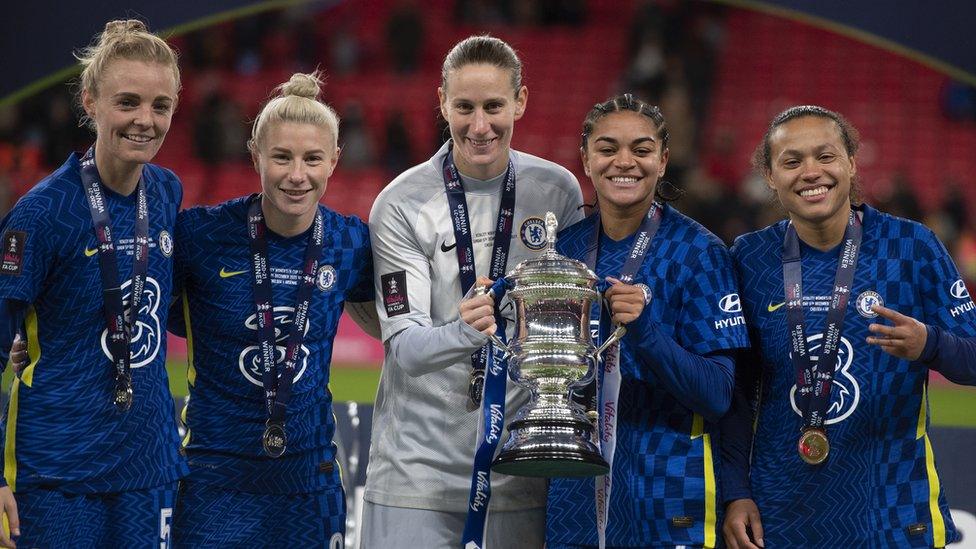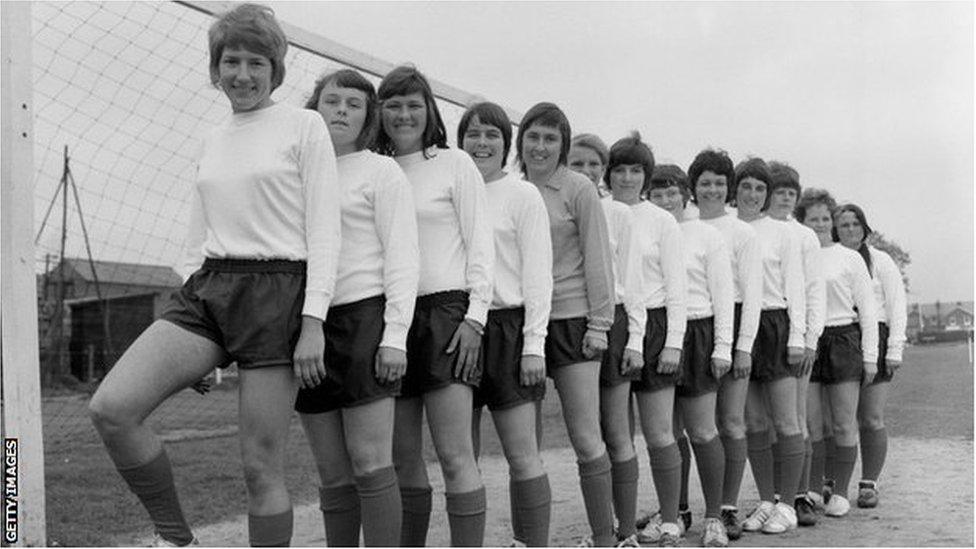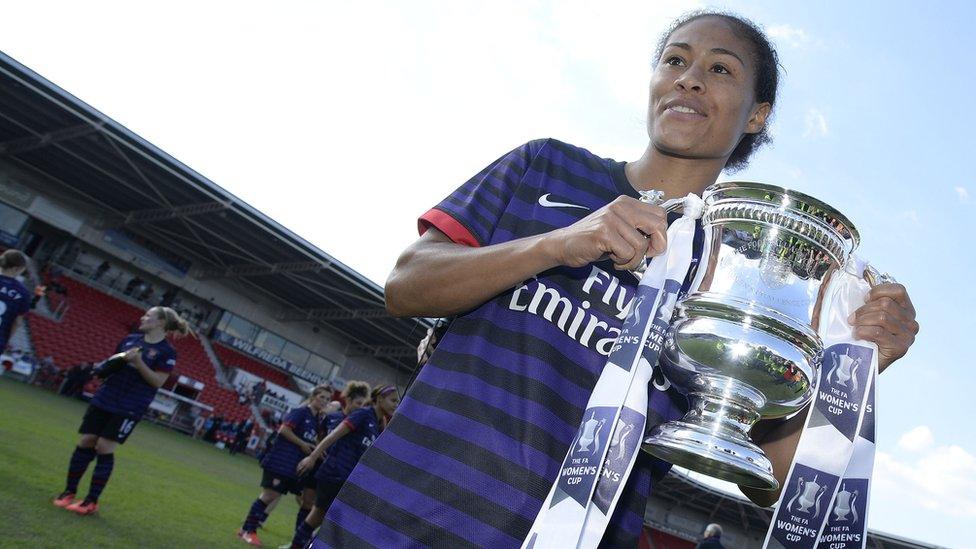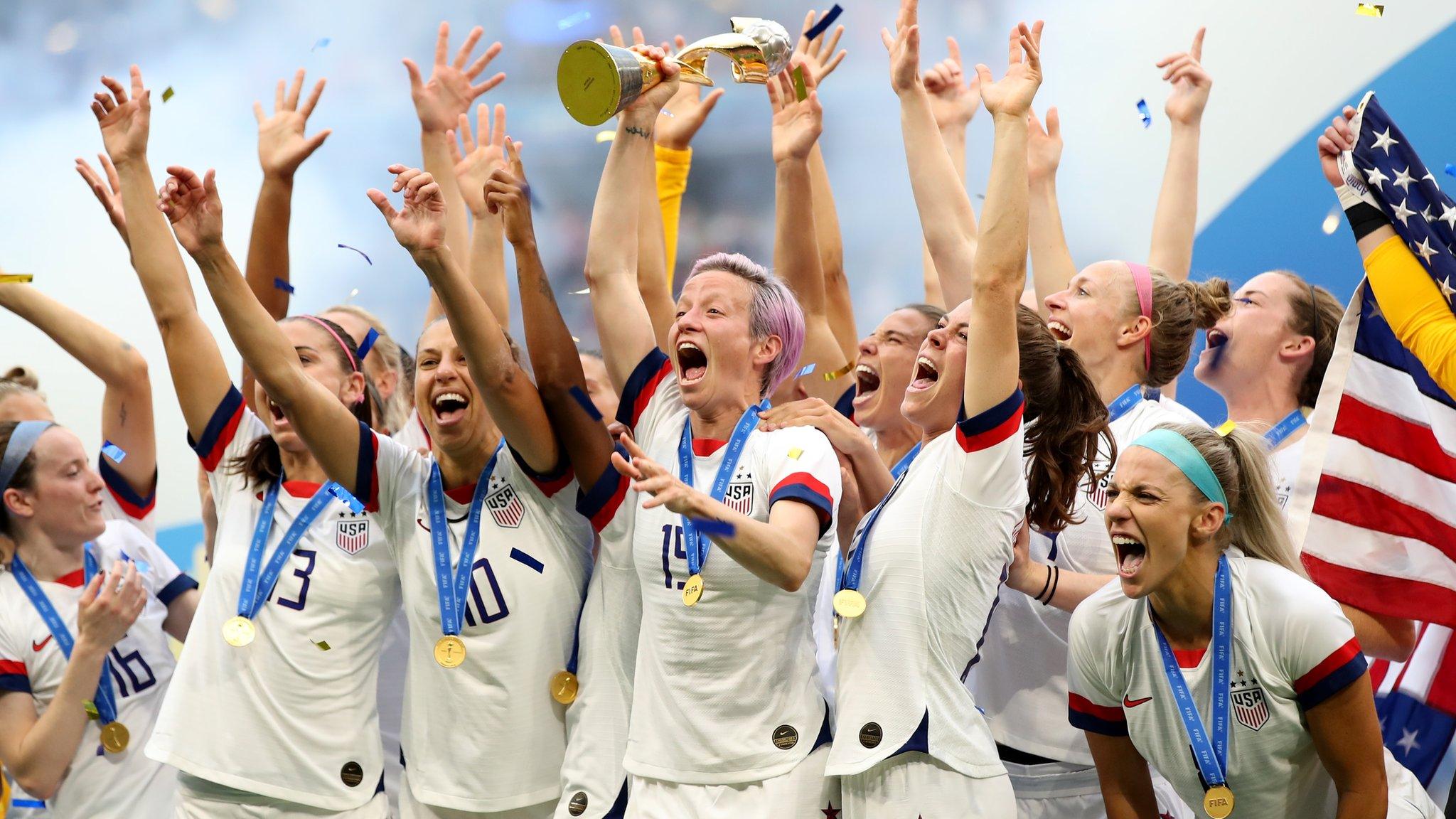Women's FA Cup: Quest to uncover the mysteries of the tournament
- Published

Ex-England player Lori Hoey says the history of the women's tournament is nowhere near as accessible as that of the men's
The men's and women's FA Cup finals will be played at Wembley Stadium on Saturday and Sunday respectively - the first time both finals have been held there in the same weekend.
For those hoping for absolute gender equality in professional football, this surely is something to celebrate.
Arguably though, there is still a long way to go.
The vast discrepancies in pay and prize money between the men's and women's games are top of the agenda for those campaigning for equality in the game.
For others, there is also important work to do in filling in the blank pages in the history books.
It is believed 73,000 FA Cup matches have been played in the men's tournament, which dates back to 1871. All but a handful of the results are documented.
By contrast, there are huge swathes of information missing from the records of the women's tournament, which was first played nearly a century later.
"When you look at what the Women's FA Cup has become now with huge crowds at Wembley, it's really important to honour the history," said Lori Hoey, a former England player.
"It's nowhere near as accessible as the history of the men's game."
Lori, who was born in Clapham, south-west London, is herself an FA Cup winner, having played for Friends of Fulham in their 2-0 victory over Doncaster Belles in the 1985 final.
Nearly 40 years on, she harbours another ambition - to track down the result of every Women's FA Cup match that's ever been played, dating back to 1970.

2021 champions Chelsea will return to Wembley Stadium this weekend
"The Women's FA Cup is a wonderful competition," said Lori. "Without it we wouldn't have got to the stage where a national league was possible and without that we would never have had a Women's Super League and professional women's players."
'Stunned by how much was missing'
Lori has kept a treasure trove of information and memorabilia from her playing career.
Her photos, newspaper cuttings and her own notes of results and line-ups have contributed to a Women's FA Cup database set up by amateur football historians Rob Dale and Tim Roast. They are hoping to track down every match result for the past 50 years.
"When I began researching women's football, I was stunned by how much was missing," said Tim, who has two daughters who play for Luton's youth teams.
"I grew up being able to learn all about the history of the men's game. If they want to learn about the history of the women's game, I want there to be as much information as possible out there for them."
Rob, who works on the rail network in London, recently had a breakthrough in an email he had been eagerly awaiting.
"It was from Gill Jones," he said.
Throughout the 1980s, Gill Jones was club secretary for District Line Ladies, a team made up largely of London Underground staff who worked on that line.
Attached to her email to Rob was a PDF he described as "vital". Sourced from the newsletters of the Women's Football Association (WFA), it listed results from the 1977-78 season all the way through to 1992-93.
How the women's FA Cup final has evolved in 50 years since FA ban was lifted
Recently, a small band of volunteers have joined Tim and Rob and Lori in their quest. Among them, me - a sports journalist at the BBC - and my former colleague Patricia Gregory, who was a founding member of the WFA in 1969.
It was lobbying from the WFA that pushed the FA into overturning what was effectively a ban on women playing. Since 1921, the FA had ruled the sport to be "quite unsuitable for females".
When the rules changed, one of the WFA's first acts was to create a Women's FA Cup.
"Girls had grown up following the men's FA Cup just like their brothers," said Patricia. "Their brothers had an FA Cup, so they wanted one too. We made sure they got one."
The first match so-far known to have been played in the competition took place on 1 November 1970 between Leicester City Supporters Ladies FC and Wandering Angels, a team from Lichfield in Staffordshire.
While a brief preview of that match is easily discoverable online in the British Newspaper Archive (BNA), it was only through an in-depth search of the BNA that Rob discovered the result. A report in the Lichfield Mercury revealed an 8-0 win for Leicester.
Why is information so hard to find?
But for all the progress Rob and Tim have made, there are still many blanks in the results tables.
For the 1985-86 tournament, the pair have not even been able to find a definitive list of the participating teams.
So why is this information so difficult to find?
For the first two decades of the Women's FA Cup competition, the women's game was run by the WFA, an almost entirely voluntary organisation, which existed on a shoestring budget. The FA took it over in 1992.
"You've got to remember the entire WFA era was pre-internet," said Patricia.

Southampton women, captained by Lesley Lloyd, won the first women's FA Cup in 1971
"For 14 years we didn't even have an office, so we had to store documents in people's homes.
"Some of that has gone missing over the years.
"When we handed over to the FA, there also seemed to be little interest in many of the documents we were trying to pass on. I suspect not everything they took was safely stored at the time."
Another reason for such sloppy record-keeping throughout the history of the women's game may be that it was simply not considered necessary.
Men's elite football in England turned fully professional in 1888, a status not bestowed on the women's game until 2018.
Football writers and, later, broadcasters were paid to faithfully commit the facts to print and tape. For as long as women's football remained amateur, much of the record-keeping did too.
No national newspaper regularly carried Women's FA Cup results throughout the WFA era, instead researchers have had to rely on those that sporadically appeared in local newspapers.
Patricia and myself became aware of Tim and Rob's project as we researched our book on the history of the Women's FA Cup final, which was published in 2021.
Ours became the first ever book to confirm a full list of scorers from every Women's FA Cup final match.
We have shared that information with the database, external and have also been happy to see it make its way onto Wikipedia, where it is now, thankfully, easily accessible to all.
Notably, through FA Cup history, many male players have been lauded for their achievements, but it seems their female counterparts have gone unrecognised.
Former Arsenal and Chelsea left-back Ashley Cole is rightly heralded for his record seven FA Cup final wins, as is Ian Rush for his record five FA Cup final goals, all for a winning Liverpool side.
'Almost an obsession'
But it required extensive research to establish that former Arsenal and Fulham forward Rachel Yankey (11 wins) and Southampton striker Pat Chapman (10 goals) are the female record holders.
Confirming these and other basic facts concerning the Women's FA Cup final games for our book has been far from easy.

Rachel Yankey (Arsenal and Fulham) had 11 FA Cup wins
So, Patricia and I had been somewhat pessimistic about Tim and Rob's chances of completing their mission.
"I thought they were mad," says Patricia. "But it has started to resemble one giant jigsaw puzzle. Each piece gives the clue to the next piece. Perhaps, one day it really can be completed."
Rob said he and Tim were continuing to build the database on a "piecemeal basis".
"More recently, individual clubs have been getting in touch with us. We've helped them fill in some of their gaps and they have helped us fill in some of ours," he added.
Tim and Rob are now appealing for anyone else with information about the competition to get in touch by emailing them at history@womensfacup.co.uk.
"Even if people have only got one result, it will help," says Rob.
For Lori, the database has become "almost an obsession."
"It's a great feeling when I come up with something in my records that can fill in one of the gaps," she said.
"Ensuring there is as much reliable information about the history of the competition and making it available to as many people as possible feels like just one way of paying tribute to all the players, coaches and volunteers who played a part in growing the game into what it is today."
Chelsea and Manchester City meet in the Women's FA final on Sunday, 15 May (kick-off at 14:30 BST), while Chelsea face Liverpool in the men's final on Saturday, 14 May (kick-off 16:45 BST).

Follow BBC London on Facebook, external, Twitter , externaland Instagram, external. Send your story ideas to hellobbclondon@bbc.co.uk, external
Related topics
- Attribution
- Published11 May 2022

- Attribution
- Published22 February 2022

- Attribution
- Published8 October 2020
